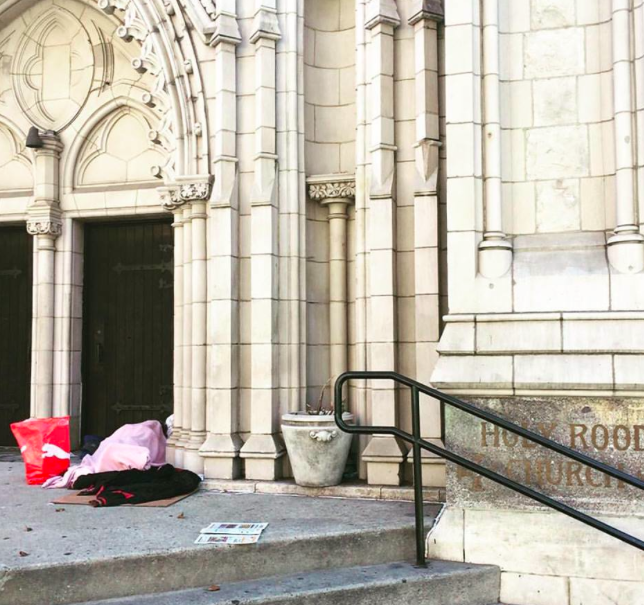Church planting often is reserved for more upper class people . . . please give this your time and listen . . .
Please consider helping through donating to one of the individual fundraisers, or start one of your own >>
0 Comments
Living Bread Ministries plants indigenous churches among the poorest communities around the globe through a community development model. Join me in helping them accomplish their goals. Join my small fundraiser.
My goal is modest, only $200. But I should have enough friends to multiply my small contribute of $25 to reach the $200. That's only 7 friends giving $25 each. But of course, any gift of any size would be greatly appreciated. Consider deferring ONE Christmas gift to help support church planting among the poorest of us on this planet. Thanks, for considering your part. Chip's Living Bread Fundraiser >>
Living Bread Ministries is leading a comprehensive church planting movement among the global poor. We plant churches among the marginalized, proclaiming the Gospel and making disciples while assisting them to meet the comprehensive needs of their community. Our unique approach combines church planting, humanitarian aid, and development work in the context of an indigenous local church. Please consider donating through my fundraiser >>
Platform for change: Output and Outcome Church Growth TrajectoriesDespite the musings of some that the NT church (and the early Jesus movement) was a protest against an oppressive Empire, the apostolic and early church lacked the power and a public platform for social and cultural change. However, the household temple-church filled in Spirit was and is the platform for making known God’s cosmic reconciliation through which cultural and social change was and is inaugurated in the world, particularly the worlds of our neighborhoods and communities. Christians did not “take to the streets,” but made known God’s cosmic reconciliation in the midst of household temple-churches through the reoriented relationships of reciprocity. Paul was calling, in particular, Gentile Christian men (i.e., the husbands-fathers-masters) to act against their own self-interests and against the norms of the dominant culture, literally to take up arms against the Empire by adopting the reconciled, sacrificial love of Messiah Jesus, demonstrating reciprocity to wives, children, and slaves. They must now live “no longer as the Gentiles walk” (4:17). Paul does not seek to overthrow the authority structures of the culture in which the Ephesian church found itself. But what he does do is instruct those in the family of God, within the all-welcoming worshipping venue, a new way of relating to one another in Messiah. This should affect what we consider as church growth. Buildings and addressed spaces do not foster relationships and authorities in a vacuum. In fact, a building decodes the concept of “the church.” This is true of a building-centered church experience, for our “church” experience and how we read and understand the Bible exist within a complex web of social, cultural, and religious meanings, habits, and relationships that are manifested in the fabric of our sacred spaces. In other words, a building-centered church experience fosters certain types of relationships, affirms a different set of authorities, and establishes a different set of burecratic powers than does a household venue as church. Today, church buildings tend to gather together the like-minded and those politically and economically similar—causing our building-centered sacred space and religious habits to be formed separate from other lesser individuals. Additionally, within a building-centered church experience the “power” a building has over people cannot be avoided, namely “the power of management, of expertise, or pure power against pure power,” while at the same time, ironically expressing “the power-refusing cross of Christ.” Perhaps, the reading of the command to be filled (Eph 5:18c) and the reoriented household code (5:22–6:9) offered throughout this paper opens other potential reasons for Paul’s final section—directly after the table—on the church, Messiah, and the powers. One could argue the need for sacred space identity in a place, but such arguments are deeply cultural. Paul locates the identity of the church both “in the heavenly places” (Eph 1:20–23; 2:6; 3:10) with the enthroned Messiah Jesus and “on earth” locally in household temple-churches. Yet, it is within the household temple-church(es) that God calls those in power, not to force others to submit, but for themselves to obey him through submission to others in the reciprocity of human relationships. As Dudrey insightfully points out, God “calls us not to seek empowerment, but to live out our lives in the moral and spiritual equivalent of martyrdom.” More specifically, God calls those with power into this new life of “martyrdom.” Within and through the household temple-churches that were spreading throughout the Empire, what it was to be human had been “irrevocably altered.” Albeit vast numbers of people flowed into the church—and that is certainly church growth as well—yet the filling in Spirit command and the reoriented household code provoke us to imagine church growth in terms of reconciliation among people, namely to recognize the value intrinsic to others and act in ways that promote outcomes of personhood (i.e., intentional reciprocity). As Megan Shannon Defranza has so poignantly observed in her book, Sex Difference in Christian Theology: Male, Female, and Intersex in the Image of God, “Postmodern vigilance on behalf of others and the Christian command to love our neighbors as ourselves call us to more careful attention to persons as they are found in the real world rather than in the ideal world of philosophical and theological systems.” Paul’s description of the household temple-church places real people from all strata of life together as church, literally giving priority of place to lesser persons and, more strikingly, calling those in power to show reciprocity in their associations with others. Therefore, potential church growth should also include outcomes of personhood and appropriate outputs (i.e., “church” activities) that ensure such outcomes. *For those following my thoughts on "Church Growth" here is my conclusion to the paper (and hopeful chapter in a forthcoming book) as I prepare for the upcoming November 2015 annual meeting of the Evangelical Theological Society in Atlanta.
Other Not by the Numbers posts >>
Typically on Sundays I offer a "Dangerous Devotion." In its place this evening, I offer a dangerous potential for considering something beyond numbers of people as a sign of church growth. The following is the section of my paper on Church Growth and Paul's Letter to the Ephesians that looks to personhood as a potential outcome of church growth. An outcome is that which signifies that something (a goal, aka here, church growth) has indeed happened. I have argued in this paper thus far that numbers of people is not the only outcome of biblical church growth, in fact, numbers of people might not be church growth at all at times. I have been exegeting and analyzing the Ephesians 5 "filling in Spirit" (v. 18) and the following household code (5:22-6:9) for clues to how Paul understood "church growth." Granted, you might need the full paper to see this conclusion, but, still, it can stand on its own (for now). You can refer to other Not by the Numbers post here on the Wasted Blog.
Potential contextual church growth outcome: Personhood“A person’s a person, no matter how small.” ~Dr. Seuss, Horton Hears a Who! It is difficult to speak of person or personhood in regards to the Bible, nor does it directly call a human being a person.[1] Nonetheless, as David Bentley Hart points out, it would not even be possible for moderns to have the ability to speak of “persons” as we do without the impact of the Christian movement. The capacity to refer to someone as a person is a “consequence of the revolution in moral sensibility that Christianity brought about.”[2] The concept of person had a much more limited function before the Christian church and presence (its form) had been let loose in the world. The Greek word prosōpon, as with the Latin persōna, was not used to indicate “a person” as we understand it in the modern sense. The etymological meaning is related to a mask or a false face such as those worn by actors in a Roman theater to portray a particular role or character.[3] The Roman court system picked up the nuance of persōna before the law, that is, a face recognized before the law. The “role” an individual played in society and among civil institutions became a significant legal referent. In the time of Jesus and Paul, it was more accurate to refer to one’s standing before the law than it was to refer to someone as a person.[4] Certain individuals had no standing or face before the law—they were not recognized by the State (i.e., the Empire) as having standing before the court. Non habens personam (not having a face, persona) was the lot of most women, children, and, certainly, slaves.[5] In modern terms, they were not recognized as persons. We assume such a category now about persons, but we would not have had such acuity in the Roman Empire at the time of the apostles. This all changed because of Christianity and the form the church had taken, for as the movement and the church spread (grew) further into the Gentile world, as the new temple-churches began to affect households and, thus, began to penetrate into the warp and woof of social mapping, eventually slaves, children, and women became known as persons. There is a modern (progressive) social amnesia regarding just how deeply Christianity has revolutionized culture and social mapping. Max Turner points out that “Ephesians does not address the question of the nature of ‘personhood’ any more directly than other New Testament book,” yet, Paul in Ephesians contrasts two different ways to regard humanity: the alienated old humanity and a new humanity that is recognized through the prism of the household temple-church in Spirit.[7] We need to hear the three socially related household pairs—wives-husbands, children-fathers, slaves-masters—within the context of the “then, but now” framing Paul has established.[8] The priority of place given to the lesser members (who had no face, no persona) in the relationship-trio changes everything: wives, children, and slaves are recognized in and through the temple-church as persons in the Lord before God, the paterfamiliar of all the families in earth and heaven. The source of Christianity’s molding power on how we recognize, acknowledge, or feel about other human beings as person with intrinsic value and worth originates, not only from the gospel’s message of love and hope, but also from the instruction and, specifically, the actual habit forming social mapping of the temple-church reflected in Paul’s reoriented household code. The death of Messiah (God’s output) brought about the reorienting of the value and worth of lesser individuals and the expansion of reciprocity among all social relationships (the outcome). The habits of the multihousehold gathering for fellowship, a meal, celebration, and apostolic instruction set in motion the redeeming and, thus, reforming of our alienated social mapping and idolatrous socially constructed reality: Wherever the lesser are recognized as persons and relationship reciprocity exists is the place (an outcome) where church growth happens. [1]Where “person” finds its way into a translation: e.g., Soul, nephesh, Gen 12:5; Exodus 1:5; 'adam, Isaiah 58:5; 'iysh, man Lev 15:4; or simply assumed.
[2]Hart, Atheist Delusions, 167. [3]The etymological path of meaning for “person” possibly passed through the the Latin personare (to sound through) a voice through became the voice behind a mask an actor used to play a character. [4]Hart, Atheist Delusions, 167. Hart notes that even Jesus did not have “person” before Pilate. A close modern example is how blacks were not recognzied before the law as a person prior to emancipation and the US State’s radification of the Thirteenth Amendment (December 6, 1865). Even today, we see the idea of person is a vital legal aspect, i.e., how (some) minorities (still), undocumented immigrants, and the unborn are not recognized before the law. [5] Ibid.,, 168: “those of the lowest stations, however—slaves, base-born, noncitizens and criminals, the utterly destitute, colonized peoples—legal personality did not really exist, or existed in the only most tenuous of forms.” Also, note some women had gained some standing before the law . . . mostly urban and affluent and mostly still only releated to protecting the wifes’patriach’s property and inheritance . . . [7]Max Turner, “Mission and Meaning in Terms of ‘Unity’ in Ephesians,” in Mission and Meaning: Essays Presented to Peter Cotterell (eds. Antony Billington, Tony Lane, and Max Turner: Carlisle: Paternoster, 1995), 138-66, here 338-39: “of being ‘man’ - one regarded as ‘false’, the other ‘true’ - and in so doing it elucidates what it means to be a person in the likeness of God.” [8] Turner, “Mission and Meaning in Terms of ‘Unity’ in Ephesians.” |
AuthorChip M. Anderson, advocate for biblical social action; pastor of an urban church plant in the Hill neighborhood of New Haven, CT; husband, father, author, former Greek & NT professor; and, 19 years involved with social action. Archives
February 2024
Categories
All
|
Pages |
More Pages |
|





 RSS Feed
RSS Feed